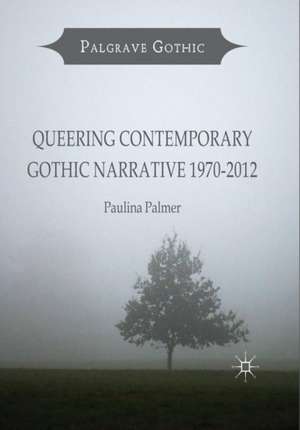Queering Contemporary Gothic Narrative 1970-2012: Palgrave Gothic
Autor Paulina Palmeren Limba Engleză Paperback – 5 mar 2018
Din seria Palgrave Gothic
- 9%
 Preț: 751.76 lei
Preț: 751.76 lei - 20%
 Preț: 626.81 lei
Preț: 626.81 lei -
 Preț: 280.08 lei
Preț: 280.08 lei -
 Preț: 351.66 lei
Preț: 351.66 lei - 20%
 Preț: 690.52 lei
Preț: 690.52 lei - 15%
 Preț: 584.10 lei
Preț: 584.10 lei - 18%
 Preț: 782.24 lei
Preț: 782.24 lei - 15%
 Preț: 694.22 lei
Preț: 694.22 lei - 15%
 Preț: 690.76 lei
Preț: 690.76 lei - 15%
 Preț: 586.88 lei
Preț: 586.88 lei -
 Preț: 351.11 lei
Preț: 351.11 lei - 18%
 Preț: 778.01 lei
Preț: 778.01 lei -
 Preț: 262.29 lei
Preț: 262.29 lei - 15%
 Preț: 635.12 lei
Preț: 635.12 lei - 15%
 Preț: 640.24 lei
Preț: 640.24 lei - 18%
 Preț: 893.21 lei
Preț: 893.21 lei - 18%
 Preț: 733.65 lei
Preț: 733.65 lei -
 Preț: 231.01 lei
Preț: 231.01 lei -
 Preț: 233.35 lei
Preț: 233.35 lei -
 Preț: 190.31 lei
Preț: 190.31 lei - 18%
 Preț: 898.26 lei
Preț: 898.26 lei -
 Preț: 387.38 lei
Preț: 387.38 lei - 15%
 Preț: 704.04 lei
Preț: 704.04 lei - 15%
 Preț: 640.88 lei
Preț: 640.88 lei - 18%
 Preț: 724.32 lei
Preț: 724.32 lei - 18%
 Preț: 788.41 lei
Preț: 788.41 lei - 18%
 Preț: 731.59 lei
Preț: 731.59 lei -
 Preț: 389.70 lei
Preț: 389.70 lei - 18%
 Preț: 731.91 lei
Preț: 731.91 lei -
 Preț: 232.16 lei
Preț: 232.16 lei - 15%
 Preț: 586.05 lei
Preț: 586.05 lei - 15%
 Preț: 698.15 lei
Preț: 698.15 lei
Preț: 210.55 lei
Nou
Puncte Express: 316
Preț estimativ în valută:
40.29€ • 42.18$ • 33.34£
40.29€ • 42.18$ • 33.34£
Carte tipărită la comandă
Livrare economică 05-19 aprilie
Preluare comenzi: 021 569.72.76
Specificații
ISBN-13: 9781349671700
ISBN-10: 1349671703
Pagini: 204
Ilustrații: IX, 204 p.
Dimensiuni: 148 x 210 x 14 mm
Greutate: 0.27 kg
Ediția:1st ed. 2016
Editura: Palgrave Macmillan UK
Colecția Palgrave Macmillan
Seria Palgrave Gothic
Locul publicării:London, United Kingdom
ISBN-10: 1349671703
Pagini: 204
Ilustrații: IX, 204 p.
Dimensiuni: 148 x 210 x 14 mm
Greutate: 0.27 kg
Ediția:1st ed. 2016
Editura: Palgrave Macmillan UK
Colecția Palgrave Macmillan
Seria Palgrave Gothic
Locul publicării:London, United Kingdom
Cuprins
1. Introduction: Queering Contemporary Gothic.- 2. Ghosts and Haunted Houses.- 3. Uncanny Others: Vampires and Doubles.- 4. Tracking the Monster.- 5. Regional Gothic: Uncanny Cites and Rural Sites.- Conclusion
Recenzii
“The narrative texts explored in this book range from historical novels to futuristic stories. … Queering Contemporary Gothic Narrative 1970-2012 is an excellent resource for those interested in the intersections between queer studies and gothic literary criticism.” (Tanya González, Studies in 20th & 21st Century Literature STTCL, February, 2018)
“The scope of Queering Contemporary Gothic Narrative 1970–2012 is stunning because the text functions as an outstanding addition to queer theory focusing on Gothic narrative. However, it is also outstanding in the ways that Palmer brings together classic and well-known and researched queer Gothic stories alongside numerous new and lesser known contemporary works.” (Ardel Haefele-Thomas, Gothic Studies, Vol. 20 (1-2), 2018)
Notă biografică
After retiring from a senior lectureship at Warwick University, Dr Palmer taught for the MA in Gender and Sexuality at Birkbeck, London University. Her publications include Contemporary Women’s Fiction: Narrative Practice and Feminist Theory; Contemporary Lesbian Writing: Dreams, Desire, Difference; Lesbian Gothic: Transgressive Fictions; The Queer Uncanny: New Perspectives on the Gothic. She teaches at City Lit College, London.
Textul de pe ultima copertă
This book explores the development of queer Gothic fiction, contextualizing it with reference to representations of queer sexualities and genders in eighteenth and nineteenth-century Gothic, as well as the sexual-political perspectives generated by the 1970s lesbian and gay liberation movements and the development of queer theory in the 1990s. The book examines the roles that Gothic motifs and narrative strategies play in depicting aspects of lesbian, gay, bisexual, transsexual and intersex experience in contemporary Gothic fiction. Gothic motifs discussed include spectrality, the haunted house, the vampire, doppelganger and monster. Regional Gothic and the contribution that Gothic tropes make to queer historical fiction and historiography receive attention, as does the AIDS narrative. Female Gothic and feminist perspectives are also explored. Writers discussed include Peter Ackroyd, Vincent Brome, Jim Grimsley, Alan Hollinghurst, Randall Kenan, Meg Kingston, Michelle Paver, Susan Swan, Louise Tondeur, Sarah Waters, Kathleen Winter and Jeanette Winterson.
Caracteristici
Discusses the way in which Gothic motifs and narrative strategies act as a vehicle for representing and examining queer sexuality and different forms of transgender and transsexuality in contemporary queer theory and fiction Examines contemporary queer Gothic fiction in the context of queer and postmodern theory Analyses the roles that spectrality, the haunted house narrative, the vampire, the doppelganger, the monster, uncanny landscapes and cityscapes and other Gothic motifs play in queer fiction Introduces reference to different kinds of contemporary queer fiction, including the ghost story, haunted house narrative, vampire narrative, the AIDS novel, and queer historical fiction and historiography
